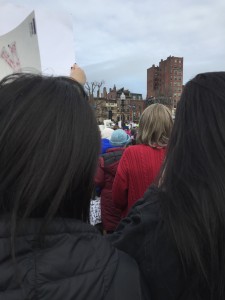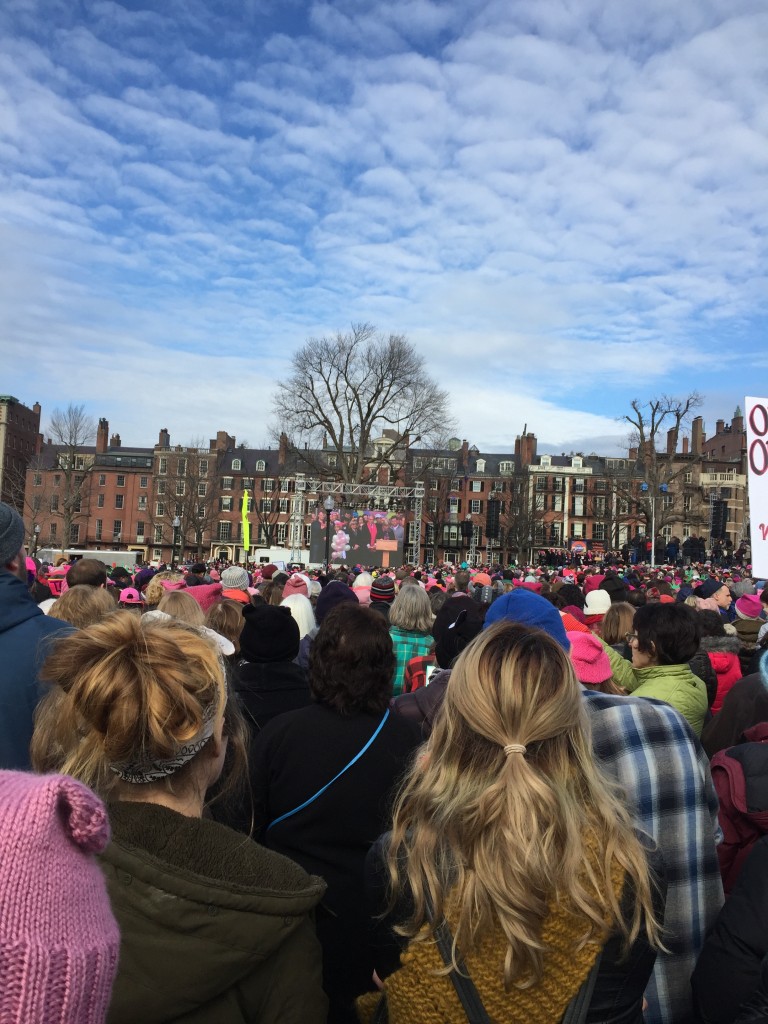“Let your life be a counter friction to stop the machine. What I have to do is to see, at any rate, that I do not lend myself to the wrong which I condemn.” Henry Thoreau, Resistance to Civil Government
On this trip to Boston, I have, among others, Henry Thoreau in mind. We are going in protest, in to protest the needy turning of a new machine, and we are not alone. Each single I is intent on being we.
Henry Thoreau’s love of paradox rises before me. A route to truth is sometimes elusive. He had to leave town to see it for what is was; I must go to the city, to join what will turn out to be 175,000 new friends to become my singular self.
The day, curiously warm for January, deepens; the slate of cloud rolls back to blue sky. We gather on Common ground.
A good while later. My focus is immediate. Yes, there are helicopters a thousand feet overhead, and I’ve seen a large drone, and they have been incessant – round and round this Common they fly – but my concerns are more pressing. It has been 30 minutes since we moved, and unused to so much unknown, close company, I have been talking myself toward calm for past few minutes. “No need to worry, you’re in no hurry,” I’ve said at the same time noting body pressure from the back and both sides. I have nearly a foot free in front; it is my breathing space. The granite gate that anchors the black, wrought iron fence and issues on to Beacon St., with Charles visible beyond, is about 50 feet away. Still 50 feet.
A young woman arrives at my left ear. “I’m sorry,” she says, anxiety pitched in her voice, “I’m trying to get out. “We all are,” three of us who inhabit a single space say. “O,” she says, and takes up position leaning on my left shoulder. “O.”
To our back right, a vibrato voice still sounds from the ginormous speakers facing the Common. Nearly an hour ago, Elizabeth Warren ended her brief speech, which featured, “Me, I choose to fight,” with a resounding, “Let’s march!” “YEA,” we roared in thousands, “YEA!” Still the speakers arrive; still we go nowhere.
And yet…and yet…it works – I feel my shoulders drop, I lean a little on my new left-shoulder companion; the tall man who has been serving as our scout – “No motion, nope, no one’s being allowed out on to Beacon” – smiles; the nearby 7-year-old who must feel he’s lost in a human forest looks stoically at the small of a back before him; to my right someone tells a bad Boston joke: “What happens if you take Trump off the T,” he asks. You get what’s left, a rump. We all groan tolerantly. We go nowhere. My wife and I look at each other from time to time, but each of us is clearly trying not to alarm the other; mostly we talk with others. Or scan for motion.
A sudden call goes up, “Medic, medic,” and hands point over to our right. “Medic, medic!” And then, “give her some room,” and the whole crowd sways like underwater kelp with the ripple of nearby emergency, and some unseen rescuer presses in from the gate, parting our human sea. Is he a Medic? No one knows. We settle again; the swaying stops.
Crowd literature, or disaster literature, is full of stories of panic let loose in such tight-packed spaces, where fences contain any possible spillage. But this crowd is different. It’s as if, after two months of individual despair and angst at the election (sort of) of a repulsive man, who is so needy that he can’t even let us despair quietly, we have suddenly been given knowledge of citizenship and family we didn’t know we had. Close family, very.
I am crowd-averse, with an American’s need for wide personal space – Don’t fence me in – and yet, even as I work to contain anxiety at being immobile, I keep smiling. To myself, I whisper, “I love these people. I love what they mean, what they hope for; I am not alone.”



